Are you taking your vitamin D? Also known as the sunshine vitamin, vitamin D is responsible for hundreds of functions in the body. While this vitamin may appear easy to obtain from sun and diet alone, vitamin D deficiency runs rampant. This is especially true for those of us living in Canada or the US, but deficiency is possible even in dreamy tropical retreats, due to folks covering up more and using sunscreen.
The risks associated with excess vitamin D might be keeping you away from supplements, out of fear of what might go wrong! But vitamin D toxicity from excess supplementation only occurs when you consume 100 times more vitamin D than the recommended daily allowance for many months at a time. In other words, the benefits of vitamin D supplements far outweigh the risks.
Curious about vitamin D? Read on for all you need to know.
Vitamin D: The difference between D and D3
But first, let’s get a few things straight. Should you supplement with vitamin D or D3? Vitamin D is synthesized by the body from sun exposure. When it comes to diet and supplement sources of vitamin D, the most common you’ll encounter are vitamin D2 and vitamin D3. Regular vitamin D supplements were, until recently, made up of what we now call vitamin D2.
Vitamin D2 in supplement form is made by exposing ergosterol, a sterol extracted from yeast or fungi, to ultraviolet light. Ergosterol from yeast and fungi plays a similar role in cholesterol in humans and animals.
Vitamin D3 in supplement form, on the other hand, is made by exposing lanolin, a natural fat from sheep’s wool, to ultraviolet light. This process results in a highly assimilable and bioavailable form of vitamin D, that according to some research, the body uses twice as effectively as vitamin D2.
So why would some people still supplement with vitamin D2 then? There are a few reasons: the most common for supplementing with vitamin D2 is if you’re a strict vegans or for those avoiding animal products.
Looking for a vegan-friendly vitamin D3 supplement?
Try CanPrev’s Vegan D3 Drops. Derived from a sustainable lichen source, this formula is further diluted with vegan, GMO-free carriers to ensure stability and potency.
Importance and benefits of vitamin D3 (at all ages!)
No matter what kind of vitamin D you prefer to supplement with, some things don’t change either way. The importance and benefits of vitamin D3 at all ages is one of them.
Vitamin D is an essential fat-soluble vitamin, which means there’s few bodily processes it is not involved in. Most importantly, vitamin D3 helps the body absorb calcium, a critical mineral for all things bone health, blood flow, muscle and nerve function, and protecting the heart and brain.
Benefits of vitamin D3 include:
- reduce inflammation
- protect against osteoporosis
- improve immune function
- maintain the health of bones and teeth
- mood support
- and more!
Everyday symptoms of a vitamin D deficiency
The most pronounced symptoms of vitamin D deficiency are rare today. Rickets in children and osteomalacia in adults cause the softening of the bones and are associated with vitamin D deficiency.
But in fact, osteomalacia is caused by a deficiency in calcium and phosphorus, which require a steady supply of vitamin D to be efficiently absorbed. Another bone condition, osteoporosis, is caused by vitamin D deficiency. Symptoms of osteoporosis include low bone density and increased risk of fractures. Women over 50 are at higher risk when it comes to developing osteoporosis, so vitamin D supplementation is often recommended by healthcare professionals.
Everyday symptoms of low vitamin D are very common. Look out for: brittle hair and nails, low back pain, muscle pain and weakness.
Food sources of vitamin D

This particular vitamin is hard to obtain from food alone, which is why supplements are so popular. Good dietary sources of vitamin D include:
- fatty fish such as: tuna, mackerel, salmon
- cod liver oil
- egg yolks
- butter
- kidney and liver (from a high quality meat source)
Even for omnivores, getting enough vitamin D from food alone is a stretch. As such, getting a good quality supplement is essential for vegans and vegetarians.
How much vitamin D3 should I take daily?
Vitamin D3 is measured in international units (IU). The recommended daily allowance, which represents the lowest amount necessary to maintain good health, is 400 IU per day for children to 800 IU per day for adults.
However, many health practitioners recommend a daily dose of 2500 IU for children 9 years and older, adolescents and adults. Find a vitamin D3 supplement in softgels or in convenient vitamin D3 drops – which are also easier for the kiddos. Tip: Softgels suspended in coconut oil triglycerides increase absorption.
If you’re not supplementing with vitamin D yet, what are you waiting for?
Disclaimer: Always consult with a healthcare professional prior to starting any new supplements to ensure it’s right for you.
Sources:
Vitamin D Deficiency in Adults: When to Test and How to Treat
Recognition and Management of Vitamin D Deficiency

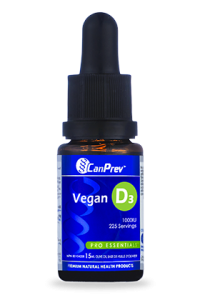
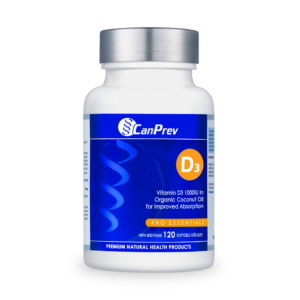
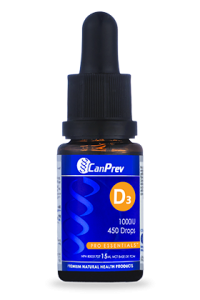

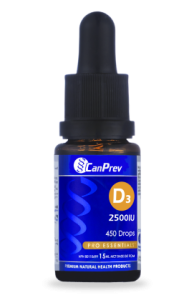

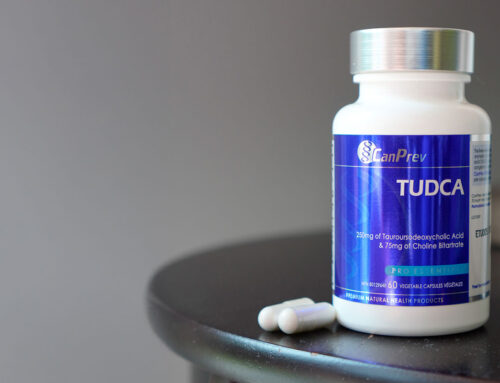
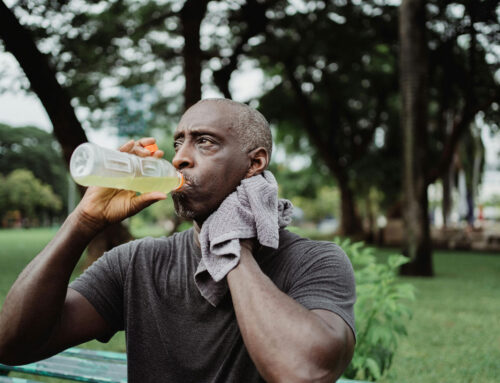




Does D3 drops contain fish products?
Hi there, thank you for your question. Our D3 drops do not contain fish. Hope this helps!
Once you open a bottle of the D3 1000 drops…how long can you use the product…what is the shelf life once opened.
Hi there, thank you for your question. Our D3 Drops will maintain potency until expiry if stored properly in a cool, dry place. Health Canada’s RDA for D3 is 1000IU/day. There are 450 drops in a bottle, divided by 4 = 112.5 days or 3.75 months worth. With standard dosing, the bottle should be empty long before the expiry date. Hope this helps!
Does vitamin d help with anxiety?
Hi there, thank you for your question. There is a strong link between anxiety/depression and vitamin D deficiency. Studies show that those who suffer from anxiety and are also vitamin D deficient can benefit from Vitamin D supplementation. However, we recommend that you speak with your healthcare practitioner first, to check your vitamin D levels so that proper supplementation and guidance can be given. Hope this helps!
Is there any difference between taking Vit D3 and Vit K separately or together in one capsule. I notice you have some capsules with both D and K in them together.
I have read that they can compete with each other and negate the benefits when it comes to bone health. What are your thoughts on this.
Hey there! Thank you for your question. We offer individual formulations of vitamin D3 and K2, as well as combined options in order to cater to every individual’s specific health goals and needs.
Studies suggest that while these two vitamins have great benefits on their own, they can make a powerful team when paired together. This is because both vitamins are heavily involved in metabolizing and retaining calcium, which means you can find them working together within the body in these processes as well.
Deciding whether to opt for taking the vitamins together or separately solely depends on every individual. As always, we recommend that you consult with your healthcare practitioner before starting any new natural health products to be sure that the nutrient and dosing is right for you. Hope this helps!